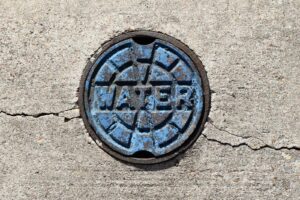As the getaway season begins many want to engage with more environmentally-minded tourism, but water scarcity and waste remain widely overlooked issues. Whether you’ve booked already or not, it’s never too late to make a difference.
When we think about eco travel, offsetting carbon emissions, swapping out flights for rail or supporting locally run restaurants or hotels may come to mind. But there is a growing crisis that is reshaping travel – water scarcity. As climate change intensifies and population growth strains water supplies, it is critical that we stop to think about how our travels contribute to global water shortages.
Staggeringly, water scarcity affects over 40 per cent of the world’s population. A quarter of people globally face extremely high levels of water stress, making them vulnerable to the impacts of drought or increased water use. There have been high profile stories of major tourist hotspots facing a ‘Day Zero’ water crisis – think Cape Town or Sao Paulo – and as our world heats up and weather patterns become harder to predict, this issue is also impacting destinations much closer to home. Take for example Andalucía in Southern Spain, where water shortages mean that residents have been without clean drinking water for over a year.
The devastating impact of tourism
Water scarcity is a growing global crisis, yet many of us remain oblivious to our role in exacerbating the problem through our travelling habits.
Swimming pools, steam rooms and wasteful practices such as the daily changing of sheets and towels all contribute to the sky high water consumption of hotels, but perhaps surprisingly, hotel bathrooms are where water consumption is highest. A hotel room typically uses around 1,500 litres every day – around 8 times more water than some local populations.
Even travellers that may closely monitor water usage at home, can be prone to adopting wasteful practices when on holiday, for example by becoming distracted while waiting for the shower to heat-up, using the shower as a way to steam clothes or forgetting that a shower is running even after they’ve left hotel premises.
This overuse of water is raising valid concerns about water inequities between tourists and the local communities, and is placing a strain on vulnerable populations who are struggling to conserve and get by on ever-depleted water resources.
How hotels are affecting positive change
Hotels around the world, especially in areas of high water stress, bear significant responsibility to increase water-use efficiency. And it’s positive to see that growing numbers of eco-conscious establishments are putting water saving measures in place to mitigate their impact on local communities and to contribute to more secure and sustainable water supplies.
Some of the most common strategies include installing water-saving shower heads and tap aerators, both of which limit the flow of water. Some forward thinking hotels are taking this one step further by going beyond small scale technologies to introduce larger scale systems that revolutionise water management and conservation efforts. Amongst other things, these technologies can enable wider water system monitoring and reporting on consumption, allowing hotels to track, analyse and cost water usage, measure CO2 and detect abnormal events like leaks.
Why we need to change our behaviour
However, technology is only a partial answer. Ultimately a hotel’s water practices will continue to be negatively impacted if guests persist in adopting wasteful practices. To truly mitigate the negative impact of the hospitality industry on local water supplies therefore relies on travellers playing their part.
Behaviour change technologies that encourage consumers to make better choices about their water use are a powerful way to promote environmentally friendly actions. Chepu Adventures Ecolodge is a great example of how these techniques can positively influence water and energy conservation. Based in Chile, the ecolodge’s busiest season coincides with the region’s driest weather.
In addition to measures that include year-round rainwater collection coupled with filtration systems, the lodge has also installed devices in guest rooms that show the room’s water and energy consumption and nudge guests to stick within hotel-recommended limits. This helps to gently encourage environmentally-aware behaviours that contribute significantly to the lodge’s broader water conservation efforts.
Rather than using coercion or persuasion to change what people think or how they behave, behaviour change techniques instead encourage travellers to make better decisions while maintaining their freedom of choice. This prompts guests to make more sustainable water choices while on holiday, while also increasing the likelihood that they will continue these practices even after they have returned home.
Not taking a break from sustainability
Seeking out hotels that are investing in water conservation strategies is a great way to support positive industry practices. But even those travellers not staying at hotels with robust water conservation measures in place can still do their bit.
At the holiday planning stage, for example, travellers should consider where they are going and when. For example, going to less water stressed areas means trips are less likely to exacerbate water supplies for already vulnerable local populations. Another simple step can be shifting travel plans to off peak tourist seasons, helping to limit ‘over-tourism’ and reducing the risk of depleting water resources for communities struggling with water scarcity.
But perhaps most important of all is being mindful of water use when on holiday. Steps such as limiting baths or showers to one a day, keeping track of the time spent in the shower and ensuring taps and showers are turned off when guests leave their hotel room, are simple ways to make a significant positive impact.
The need for collective action
Meaningful change requires coordinated efforts and a genuine commitment from big players including the hotel industry and policy makers. But as travellers, we also have a significant role to play.
As the global climate emergency accelerates, it is crucial that we re-evaluate our water habits and adopt sustainable approaches when we leave home. The value of water far outstrips the price we pay for it. By consciously reducing our water use, we can support local communities and preserve destinations for future travellers for years to come.
Kevin Wright is Chief Brand Officer and business strategist at Showerkap, a pioneering tech company on a mission to change how people use water and energy. Its platform combines engineering and behavioural science in a first-of-its-kind smart technology, enabling users to reduce water waste, carbon emissions and costs.
More features:
Facilities management is evolving in favour of sustainability
Design-led approaches to heritage can support sustainability
Quick question: How do vanadium flow batteries stabilise a renewable grid?
















